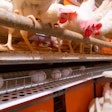
In a WATT Poultry Chat, Dr. Shelby Ramirez, technical manager, poultry global, at dsm-firmenich, discusses the differences between conventional and modern flock health strategies, the challenges that producers might face in managing their flock’s health and how early detection of issues allows immediate action to be taken.
Mark Clements: What are the key aspects that we should focus on in modern poultry production?
Dr. Shelby Ramirez: Yeah, at a high level, there are three main goals for poultry production: improving nutrient utilization for feed formulation, flexibility, and performance; ensuring the safety, quality and sustainability of poultry, meat and eggs; and protecting flock health while reducing production costs. We at dsm-firmenich have proven solutions to help producers achieve their goals through various strategies that are used from conventional to modern.
Mark Clements: Are there many differences between conventional and modern health strategies?
Dr. Shelby Ramirez: Challenges like coccidiosis, necrotic enteritis, lameness, chick quality and mortality have historically been treated using conventional health solutions, like antibiotics, chemicals and ionophores. Many producers have transitioned to, or are exploring, more modern health strategies, like vaccines and feed additives, to avoid antimicrobial resistance, as well as to improve the flock welfare. Understanding what challenges producers are facing, and providing solutions that address those challenges, is what we at dsm-firmenich are here to help with.
Mark Clements: So, what sort of challenges might producers be facing in terms of their flock health?
Dr. Shelby Ramirez: For some producers using conventional approaches, they might experience reduced efficiency, or effectiveness, of those tools over time, and start seeing increased prevalence, or severity, of different health challenges, which can indicate that there is a development of antimicrobial resistance. Bacteria want to stick inside the gut and feed on readily available nutrients. So taking away the attachment sites in the gut using symbiotics, such as PoultryStar, and taking away food sources using precision biotics, such as Symphiome, are ways that modern health solutions can help prevent potentially pathogenic bacteria from blooming. Eimeria can also develop resistance to chemicals and ionophores, so many producers have adopted different rotation and shuttle programs to incorporate other solutions like cocci vaccines, and feed additives like Digestarom PEP-Y. Other predisposing factors in the environment, or diet, can also play a role in establishing health challenges. So, ensuring optimal immunity and reducing the risk of mycotoxins through mycotoxin deactivators, like Mycofix, will be key areas to focus on. We at dsm-firmenich provide services to detect challenges early and comprehensive solutions to protect flock health.
Mark Clements: And how can we ensure early detection for example?
Dr. Shelby Ramirez: Typically we know of an outbreak of a disease during or after the onset, based on obvious classical clinical signs. However, analyzing the biological samples and related metadata for signs of challenges, health or nutritional, as early as possible in the bird’s life helps to prevent the outbreak, loss of productivity and profitability. We at dsm-firmenich offer Verax, a precise early detection and decision making tool that combines infield production data, biomarker results and consultative service to pinpoint that challenge and provide suggestions to mitigate those challenges early. Early detection of health issues and nutritional deficiencies lets you take immediate action and continuously improve the performance of your operation.

















